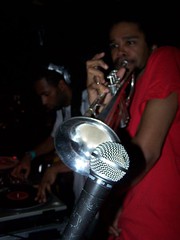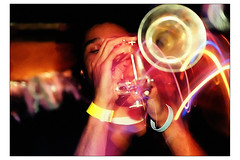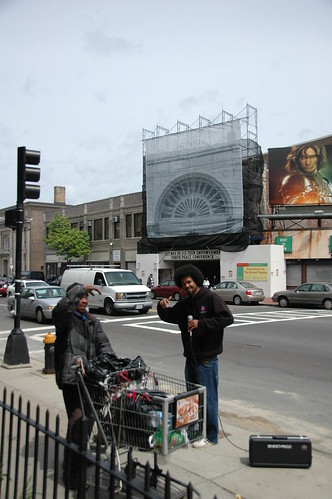 Birth of the beat:
Birth of the beat:Afro DZ ak elevates Boston underground
By Michael O'Brien
His dad was born in the Democratic Republic of Congo, while his mother was born and raised in Kansas. At Tufts University, he majored in international relations, and after college he has worked in community development and education. One of the causes he supports is the affordability of higher education. Sounds a lot like Barack Obama, but it's actually the pedigree of Pete Shungu - also known on stage as Afro DZ ak - a trumpeter, rapper, and spoken-word poet who writes smooth, jazz-influenced hip-hop and performs in Boston's notorious underground scene. He just released his debut album Elevation on Gnawledge Records, which was founded and is managed by Canyon Cody, BC '06, and Sean Dwyer, BC '04. Despite the difference in occupation, the similarities between his and Obama's personal histories aren't purely coincidental: Obama has constantly been a source of inspiration for Shungu ever since he read Dreams from My Father, in which Obama discusses his life, particularly the reality of his multiracial heritage. This background is one of the subjects Shungu explores in his music.
Shungu was introduced to music at an early age when his mother signed him up for piano lessons. "I was a typical kid who hated practicing, but that kind of sparked my interest in music in general," he says.
In the fifth grade, he picked up trumpet and also started getting into hip-hop, listening to an eclectic assortment of artists, ranging from Public Enemy to A Tribe Called Quest, and from De La Soul to Naughty by Nature and Dr. Dre.
"When you first get into music you don't see the distinction between what's commercial and what's conscious," Shungu says.
He says commercial rap started declining around the time he was developing his own musical consciousness. Around this time, he discovered alternative hip-hop pioneers like Common, Mos Def, and Talib Kweli. From listening to these artists, he developed his own artistic style. He rejected the mainstream's raw, thug mentality and opted for the intelligent, conscientious one of the aforementioned alternative pioneers. For Shungu, music became an approach for tackling important issues.
 It wasn't until years later that he discovered his passion for jazz. "My high school had this music director who was really into jazz and completely opened my mind to all different styles of music," he says.
It wasn't until years later that he discovered his passion for jazz. "My high school had this music director who was really into jazz and completely opened my mind to all different styles of music," he says.His jazz influences include Miles Davis, John Coltrane, and Freddie Hubbard. He admits that, though it sounds cliche by now, Davis' earlier style in classics like Kind of Blue and Birth of the Cool profoundly influenced his own. He focuses on trumpet playing that is emotional, rather than fast.
"I'm not going to say I can play like Miles or anything, but being about emotion and not being about playing a million notes is something that made me able to play with a lot of different people. In addition to my own album, I play trumpet on probably 15 other albums with hip-hop bands, rock bands, and jazz bands."
Throughout high school, he stuck with his musical commitments by playing in the concert and jazz bands, while also playing soccer. By the time Shungu graduated from high school, he was composing his own parts for trumpet. Once he was in college, he started getting into rhyming and rapping.
"It was kind of a gradual process," he says.
He graduated from Tufts University in 2003, majoring in international relations. Unlike a lot of the musicians he has worked with, he hasn't been in bands all his life; though he wrote music and lyrics, he didn't start performing until after college.
 Besides his solo work as Afro DZ ak, Shungu is a former member of the Eclectic Collective and also plays in a six-piece soul band called Soul Movement. He met Dwyer at a show a few years back at the Western Front in Cambridge. The two burgeoning musicians exchanged information, and Dwyer eventually called Shungu. After that, they lived together in an apartment in Somerville, Mass., for a year and half.
Besides his solo work as Afro DZ ak, Shungu is a former member of the Eclectic Collective and also plays in a six-piece soul band called Soul Movement. He met Dwyer at a show a few years back at the Western Front in Cambridge. The two burgeoning musicians exchanged information, and Dwyer eventually called Shungu. After that, they lived together in an apartment in Somerville, Mass., for a year and half."At the time we knew about each other's music. We respected each other and started working on music," he says.
Dwyer, whose stage name is Gnotes, released an album titled Inthrumental in 2006, on which Shungu contributed trumpet parts. After meeting Dwyer, he was introduced to Cody, whom he describes as Gnawledge's "brain child."
"People ask me, 'Are you a part of a label?' I say it's more like a family, a collective of artists supporting each other."
After Dwyer's album was released, the two got to work on Shungu's. It took about six months to put together. Some of the tracks were written as long as four years ago, but most of them were recently put together within the last year, and some of the beats were picked up from friends. All in all, the process was smooth.
 "Since I'm a musician as well, a lot of it is organic. I play keys on a few tracks so I'll come up with a keys groove and then make the beats myself."
"Since I'm a musician as well, a lot of it is organic. I play keys on a few tracks so I'll come up with a keys groove and then make the beats myself."Dwyer engineered the album, layering Shungu's various parts into catchy, cohesive songs.
Shungu admits that he has no consistent artistic process, but spontaneously writes musical parts and lyrics whenever he is inspired, particularly when he is driving.
"A lot of time I would be listening to instrumentals in the car and come up with lyrics in my head, write them down, and later develop the track," he says.
He currently works for a nonprofit company called Access, assisting high school seniors in the Boston public school system with the financial aid process for college. The job, he says, is a lot like being a guidance counselor, but is solely focused on college preparation. Overall, he loves working in education and thinks it is a good balance for his musical aspirations, and also another source of inspiration.
"The work that I'm doing gives me material to talk about in some of my writing," he says.
His outlook for the future is to keep working on music and in education.
"I don't think I'd feel complete if I gave up either music or working with young people."






